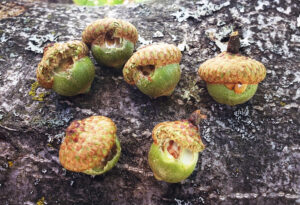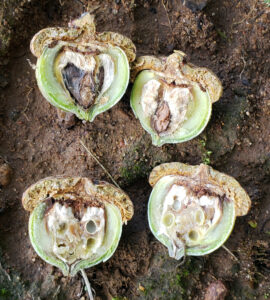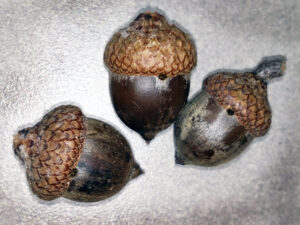By Linda Williams, DNR Forest Health Specialist, Woodruff
Linda.Williams@wisconsin.gov or 920-360-0665

The acorn farthest on the right has pip galls. Squirrels ate the pip galls from the other acorns. / Photo Credit: Linda Williams, Wisconsin DNR
Several areas in northern Wisconsin have reported significant acorn drop. In almost all cases, these acorns have been damaged by either pip galls or acorn weevils.
Squirrels enjoy feeding on pip galls and will pluck those acorns off the tree, rip off the cap, eat the pip gall and drop the rest of the acorn to the ground. Squirrels will also seek out acorns infested by acorn weevils. They will open those acorns, eat the larvae and then drop the rest of the acorn to the ground.

Acorns that have been cut open to reveal damage from acorn weevils. / Photo Credit: Linda Williams, Wisconsin DNR
In a 1996 study that appeared in the Journal of Mammology, squirrels were observed to consume weevil larvae in more than 76 % of all trials with infested acorns. The researchers remarked that weevils represent a significant dietary supplement for squirrels.
Infested acorns will continue to drop over the remainder of the growing season where infestation rates are high. By the time you notice the damage to the acorns, it’s too late to attempt treatment to prevent damage.
If you’re planning to collect acorns for planting purposes, be sure to float the acorns first to determine which ones are still viable. Acorns that float are generally considered nonviable and should be discarded.

Small holes in acorns show where acorn weevil larvae chewed out of the acorn to find a place to pupate. / Photo Credit: Linda Williams, Wisconsin DNR
